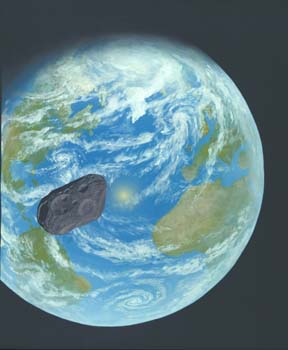Meteor showers to devastate planet Earth
Someone in deep black space deliberately bombards the Earth with meteorites
Residents of Jakarta and two other neighboring Indonesian towns were frightened with a series of loud explosions on December 18th overnight. Western special services warned Jakarta of possible terrorists acts in the country on Christmas Eve. The police, however, did not find any destruction either in Jakarta, or near it. Local television channels reported that several people had seen some objects, possibly meteorites, falling down from the sky. There were no meteorites found in the area either. 
The Indonesian Air Force confirmed the meteorite origin of the above-mentioned explosions in Jakarta: radars registered an unidentified flying object, which was falling down on the ground at a very high speed. Astronomers supported the space version too: they said that eyewitnesses had seen meteorites, not a crashed spacecraft.
The mystery of December blasts in Jakarta has not been unveiled yet. If it was really a large meteorite that fell into pieces and exploded in the Earth's atmosphere, one may say that it was not a “timely” meteorite at all.
December is the time of meteor showers, especially the Geminids and the Ursids. The Geminids light the night sky as they fly from the constellation of Gemini on December 14th. The mysterious explosions in Jakarta occurred on December 19th – it was too late for the Geminid meteor shower, as it had flown away already on December 17th. There is another meteor shower called Ursid - these meteorites are considered to be fragments of 8P/Tuttle comet, which, as scientists believe, neared Jupiter and exploded 600 years ago. December 19th was not a good date for the Ursids either, for they appear in the sky at night of December 22nd. If there was a meteorite in Jakarta, it must have been a very unusual meteorite.
As a rule, meteorites do not fall down on inhabited localities. They prefer to hit seas, lakes, fields and even the Antarctic. There can be exceptions from the rule, of course. A large meteorite blew up above the village of Boqate Ha Sofonia in Lesotho, South Africa, two years ago. The space rock burst into thousands of small fragments (400 of them were found afterwards) and showered down on village houses. One of the pieces flew into a kitchen window and burnt a plastic container there. Local residents had to experience the invasion of scientists later, who determined that the meteorite originally weighed about one ton. It was orbiting the Sun for 4.6 million years, until it broke into the Earth's atmosphere at the speed, which exceeded the sound speed 50-100 times.
A recent research showed that the number of meteorite collectors considerably increased owing to the Internet. It is noteworthy that the black market of meteorites has been very active in 2004. Meteorite trafficking and robbery has become much more frequent; the prices on space rocks started growing too. Lunar and Martian stones are especially expensive – the prices on them can reach $30,000 per gram, which is 3,000 times as expensive as gold.
Reports about meteorites falling down on Earth appear almost every week. A strange object was seen flying across the Australian sky shortly before the above-mentioned Jakarta meteor. Unusual luminescence and roaring sounds have recently been registered in the sky above several German towns. Scientists said that those phenomena had been caused with fragments of asteroids in the Earth's atmosphere.
Doctor Valeri Rudakov from the Institute of Earth's Physics believes that one should not underestimate the meteor danger. “Meteorites might cause considerable damage to our civilization. They can destroy enterprises, level electric power stations, not to mention nuclear power plants. In addition to it, meteorites can cause tremendous earthquakes and volcano eruptions,” the scientist said.
Reports about meteorites appearing in the sky of planet Earth have become much more frequent indeed. It was generally believed before that small meteorites hit the Earth once in a hundred years whereas large meteorites, the Tunguska meteorite, for example, fall down on the planet once in a thousand years. It is clear now that it was a wrong assumption. One may recollect the large Vitimsky meteorite, which fell down two years ago in Siberia – it has become the second “gift” from space in 100 years. The need in space protection programs is becoming more obvious. Russian and American scientists were going to create a joint space interception system several years ago. The governments of the two countries, however, preferred not to assign any money for the program, and the question went into the background.
The international symposium dedicated to the asteroid security took place a week ago in Tenerife. Doctor Sergei Gusyakov represented Russia at the conference – the scientist took part in the mission to explore the phenomenon of the Vitimsky meteorite. “The pictures that we took in the Siberian woods in the north of the Irkutsk region produced a sensation. It became clear that it was a huge meteorite, which could have caused a monstrous devastation in Europe, for example,” Gusyakov said. When the researcher returned home from the symposium, he was informed about another incident in the Irkutsk region: a large 10-ton celestial body fell down in the northern part of the region again.
Experts do not know why incidents with meteorites have become so frequent nowadays. One of the versions says that someone in deep black space deliberately bombards the Earth with meteorites.
Spacecraft Impactor is to collide with Tempel-1 comet on 4 July 2005. Flyby spaceship, which carries the Impactor to the target, will observe the first-ever collision between the man-made craft and the celestial body. The goal of the 300-million-dollar program called “Deep Impact” is to obtain the inner substance of the comet. Scientists believe that the comet substance will be the source of extremely important information about space, for the substance has remained unchanged since the time, when the Solar System was formed.
The Flyby spacecraft is to be launched on 28 January 2005. Impactor will fly to the comet at the speed of 37,000 kilometers per hour. Flyby's scientific equipment and telescopes of astronomic laboratories on Earth will analyze the cloud of the comet substance after the impact. It is not ruled out, though, that someone will wish to explore our planet with the help of such a barbaric method too.
Subscribe to Pravda.Ru Telegram channel, Facebook, RSS!





